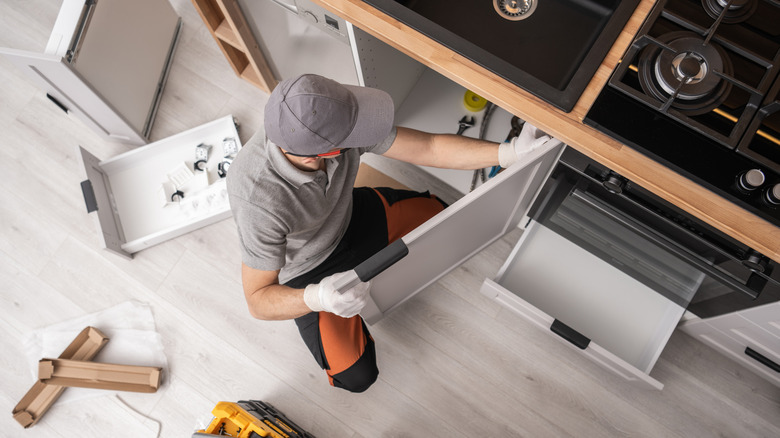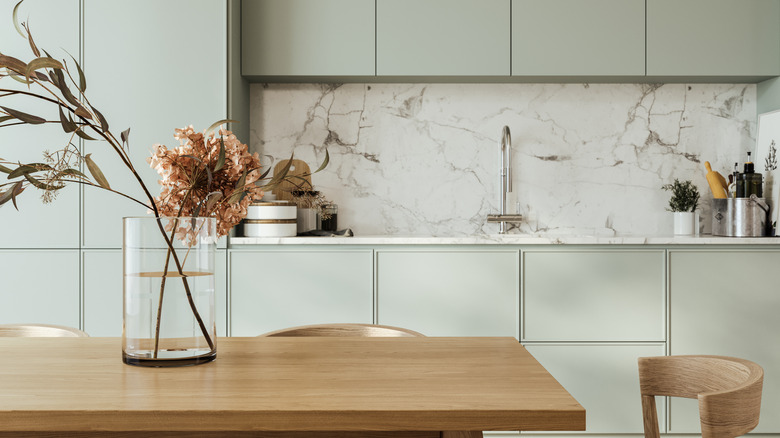Are High-End Kitchen Remodels Worth The Price?
It's hard to resist the temptation of a shiny, high-end kitchen remodel. Maybe you've seen a kitchen with a brutalist style heat-resistant concrete countertop, or a minimalist design that ditches traditional dish racks for sleek, clean lines and built-in cabinetry. While a remodel can certainly breathe new life into a tired space, is the high price tag always worth it? To find out, Food Republic consulted Paul Dashevsky, co-CEO at GreatBuildz.
According to Dashevsky, "Upscale improvements can certainly be worth the investment if executed with a sense of balance between design panache, functionality, and market sensibility." The most important factor to weigh before splurging is "adherence to the home's price range and location," he explained. "If you over-improve — say, install a $200,000 kitchen in a $900,000 home in a $1 million neighborhood — you'll never recoup that money." No matter how luxurious your remodel is, a home's value is ultimately anchored to comparable properties in the same area.
"But if the update will bring your home to parity with comparable homes, it's worth doing," Dashevsky added. "Quality of craftsmanship, functionality of layout, and timeless finishes (rather than trendy finishes) also play an important role in ROI [return on investment]." While trendy kitchens may be all the rage right now, design fads come and go. Just look at once-popular styles that now feel dated, like these cluttered backsplash designs, the Tuscan aesthetic, and even millennial white is currently on its way out. Leaning too heavily on trends may spruce up your kitchen in the short term, but over time, it can put that expensive remodel at risk of aging poorly and becoming less attractive to potential buyers.
How remodel costs stacks up against value and function
The decision to invest in a kitchen remodel can be a daunting one, and most homeowners will be looking for some bang for their buck, or ROI. According to Paul Dashevsky, "Homeowners can expect to recover roughly 50% [to] 70% of the expense of an upscale kitchen remodel in resale value in the current market." That's not too bad, but compared to the national minor kitchen remodel ROI, which is 113% (via Zillow,) it's clear that sometimes less is more. ROI is also heavily influenced by regional variations, and tends to be higher in "competitive areas like major metros," Dashevsky added. So a remodel in cities with a booming property market like New York, Los Angeles, or Chicago could see higher returns than the national average.
While ROI is something that should always be taken into consideration, "the payoff in day-to-day livability is just as valuable," Dashevsky explained. "A kitchen that is well-designed with better flow, more counter space, and high-efficiency appliances can fundamentally transform the way a home functions and lives." A remodel is more than just a financial investment. While you may eventually sell your home, you're the one who's going to be enjoying that new kitchen in the meantime. Smaller updates may be the smart and cost-effective choice, but they don't offer the same level of transformation as a full, high-end remodel, which can completely redefine a space. This can make a high-end remodel not just a sound financial decision, but also a meaningful investment in your lifestyle.
Upgrades that pay off versus those that don't
When upgrading a kitchen, some improvements can significantly boost your home's overall value — while others may actually drag it down. Knowing the difference is key if you're aiming for a strong return on investment, and just as important if you want to curate a space that delivers lasting quality and functionality for everyday living. According to Paul Dashevsky, "upgrades that wed luxury and longevity stand a better chance of paying off."
"High-end appliances (Wolf, Sub-Zero, Thermador) [are] attractive to serious buyers," he explained. Having well-known, high-quality name brands in your kitchen is a great way to immediately signify quality and luxury. Other high-end luxury brands that have Smart options include Miele, known for its quality and German engineering, as well as Viking, which offers high-end products at different price points to fit various budgets.
Other factors to consider are installing luxury hardware that also serves a functional purpose. "Natural stone or quartz countertops," Dashevsky noted, are "timeless, durable, and sought after." In contrast, while countertop materials like marble offer undeniable luxury appeal, they tend to be more prone to staining and wear, which could deter serious buyers seeking both aesthetics and practicality. This is why Dashevsky recommended avoiding "purely aesthetic indulgences like flashy statement tiles, über-custom finishes, or specialty materials," as they often cater to highly specific, niche tastes rather than timeless elegance and functionality.



